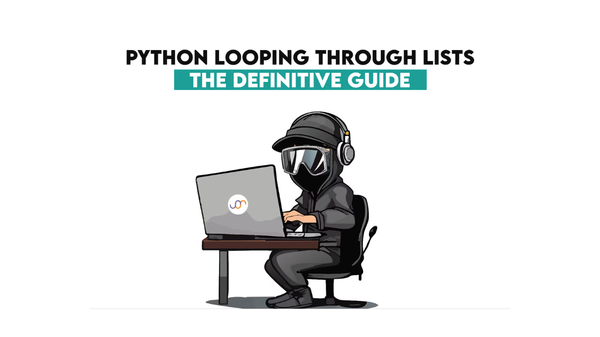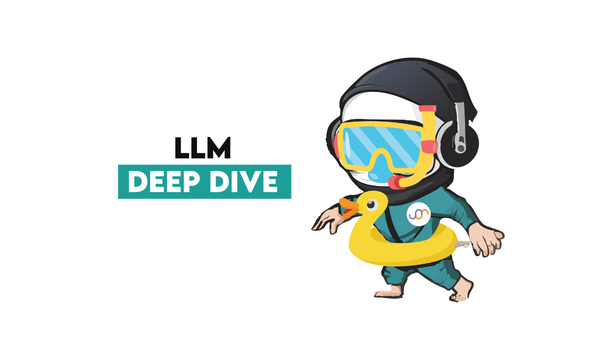A Complete Guide to Data Scientist Career Path

 Written by:
Written by:Nathan Rosidi
In this guide, we’ll talk about where the data scientist career path could lead and what are the industries ideal for building this path.
Don’t think of this guide as a rigid rule book proscribing how your data scientist career path should look. How your career path will look like depends on you: your interests, your educational background, your skills as a data scientist, the industry you’re in, the (size of the) company you work in, and, of course, a little bit of luck in achieving whatever you want in your professional life.
We want to give you a general overview of what the data scientist career path often looks like. It can unveil some possibilities you didn’t know existed and provide you with direction and new insights into the possibilities as a data scientist.
You can build your data career only where they want you. That’s why it’s a good idea to talk about the industries that give you the most possibilities as a data scientist.
Top Industries for a Data Scientist
Out of all jobs with ‘data science’ posted on the Glassdoor website, these are the top five industries with the most job ads.
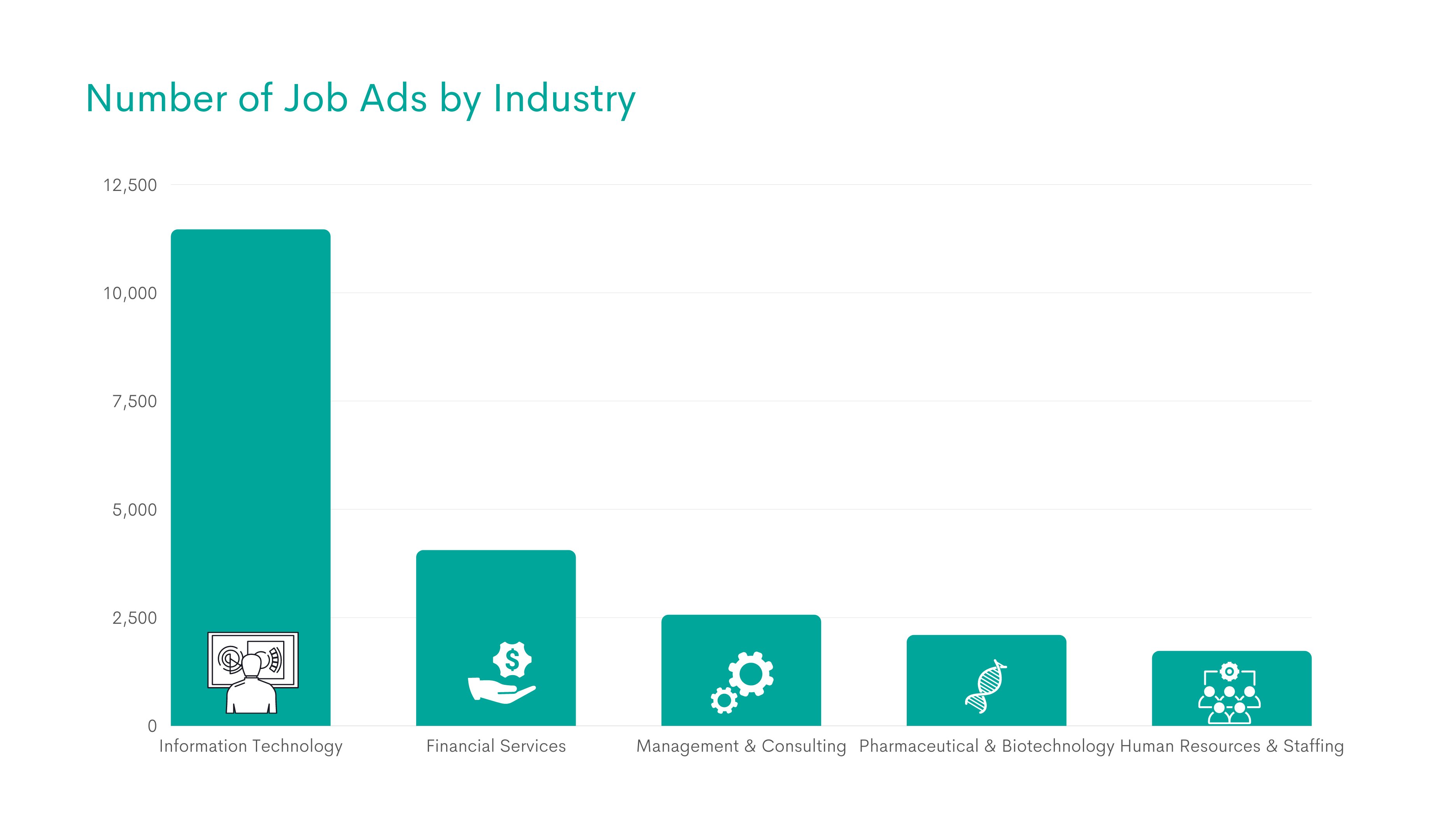
You can see that Information Technology offers the most opportunities for data scientists, by far. In total, these five industries posted 21,901 job ads, which is 87% of the total job ads. These numbers are for the USA, but we can safely conclude they can generally be applied worldwide.
Information Technology
Information technology needs data scientists in a wide range of roles. It can be to manage hardware and software, develop IT products and services, predict market trends and customer behavior, target advertising, take care of cybersecurity, etc.
Financial Services
The second most popular industry for data scientists is financial services. It also offers plenty of different opportunities. For example, you can detect financial fraud, create and improve credit rating models, segment customers, predict their behavior, and improve pricing models. Data scientists are also needed in stock and FX trading, risk management, financial analysis, and so on.
Management & Consulting
This is an industry that includes various types of consulting services, such as financial, legal, tax, advertising, data and database management, or other IT services. You could be working on identifying historical patterns in the court’s rulings, targeting customers with advertising campaigns, managing other companies’ databases and creating the software solutions for them, analyzing their financial data and steering them in improving their business, etc.
Pharmaceutical & Biotechnology
When it comes to the pharmaceutical and biotechnology industry, data scientists are again highly in demand. Their skills are used to create predictive models on the molecular and clinical data that help in drug discovery and drug trials. Your skills are also needed in the market side of the business: you’ll analyze the market, discover your potential customers, and target advertising to them.
Human Resources & Staffing
Maybe a little unexpected, but Human Resources & Staffing is in the top five industries for data scientists. What can you do there? First of all, you could analyze the job market and potential employees, which includes evaluating the candidates’ skills and predicting their future performance and development. Also, you could predict employee turnover, plan their educational programs, measure their performance, anticipate the company’s need for new employees, etc.
After covering the most common industries for a data scientist, it’s time to have a look at the data scientist career path options.
Data Scientist Career Path
The path we’re going to show is concerned with the hierarchical level within the organization and less so with different types of jobs a data scientist can do. If you’re interested in the latter, it’s best that you take a look at 14 data science job titles. The data scientist’s career path usually starts as an individual contributor (IC).
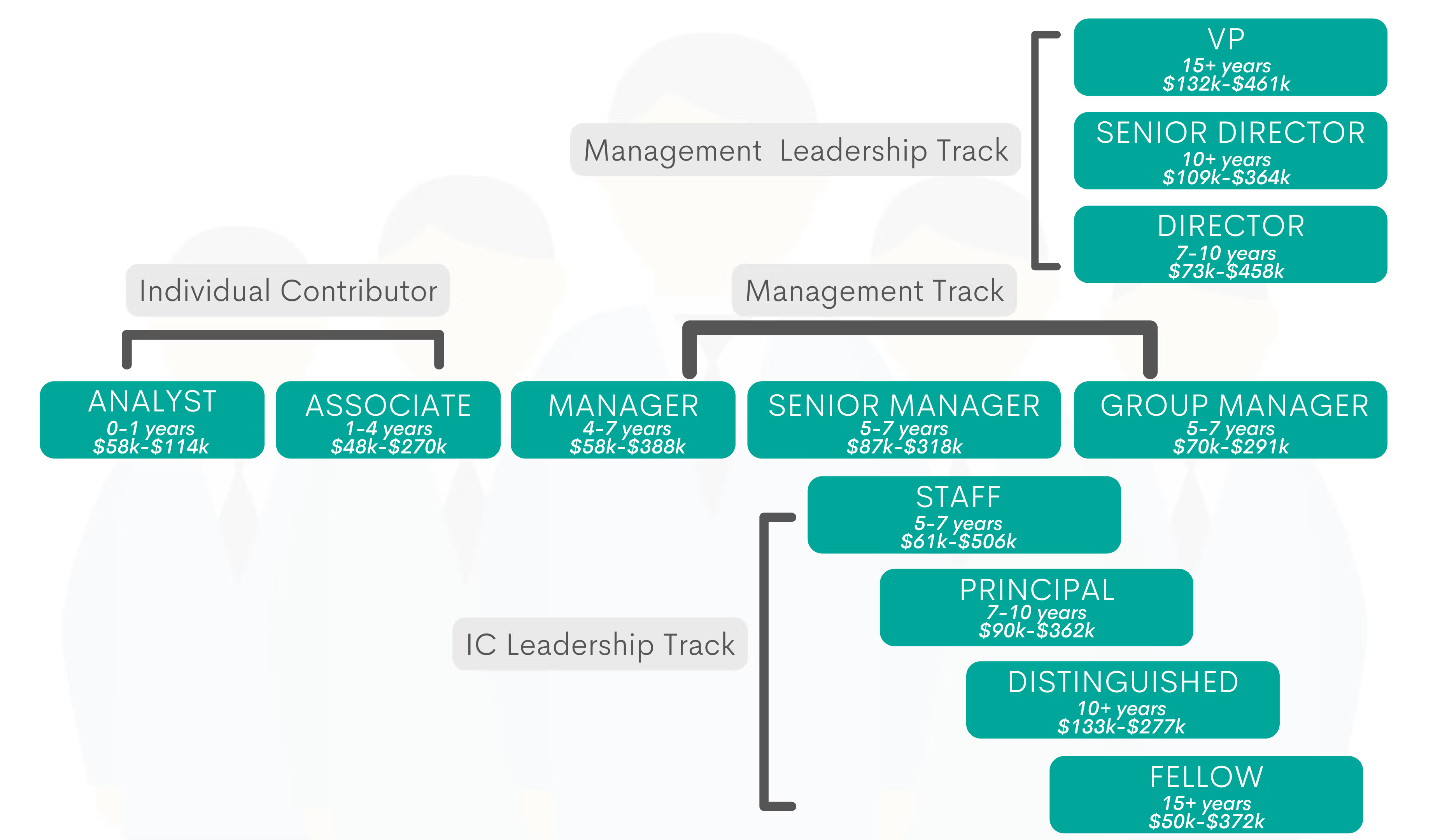
They’re not responsible for managing anyone, they are employees carrying out the operational work. On this path, you can be:
- Analyst
- Associate
After the Associate level, you’ve gained a respectable amount of experience. Now it’s time that you become leading teams and start the Management Track. There are three positions available here:
- Manager
- Senior Manager
- Group Manager
After becoming a Group Manager, the career path branches off into two leadership tracks. While both relate to leadership positions, they are different.
The first one is the Management Leadership Track, which focuses on managing a team. The three levels are:
- Director
- Senior Director
- Vicepresident (VP)
The other leadership track is the IC Leadership Track. This one relates to managing large projects as an IC. It also has four levels:
- Staff
- Principal
- Distinguished
- Fellow
We’ll now go through all the positions and talk about what they are, how much experience and which skills they require, and what salary they offer. Before that, it’s essential that you understand what a data scientist does.
Here’s an overview of the data science career path positions.
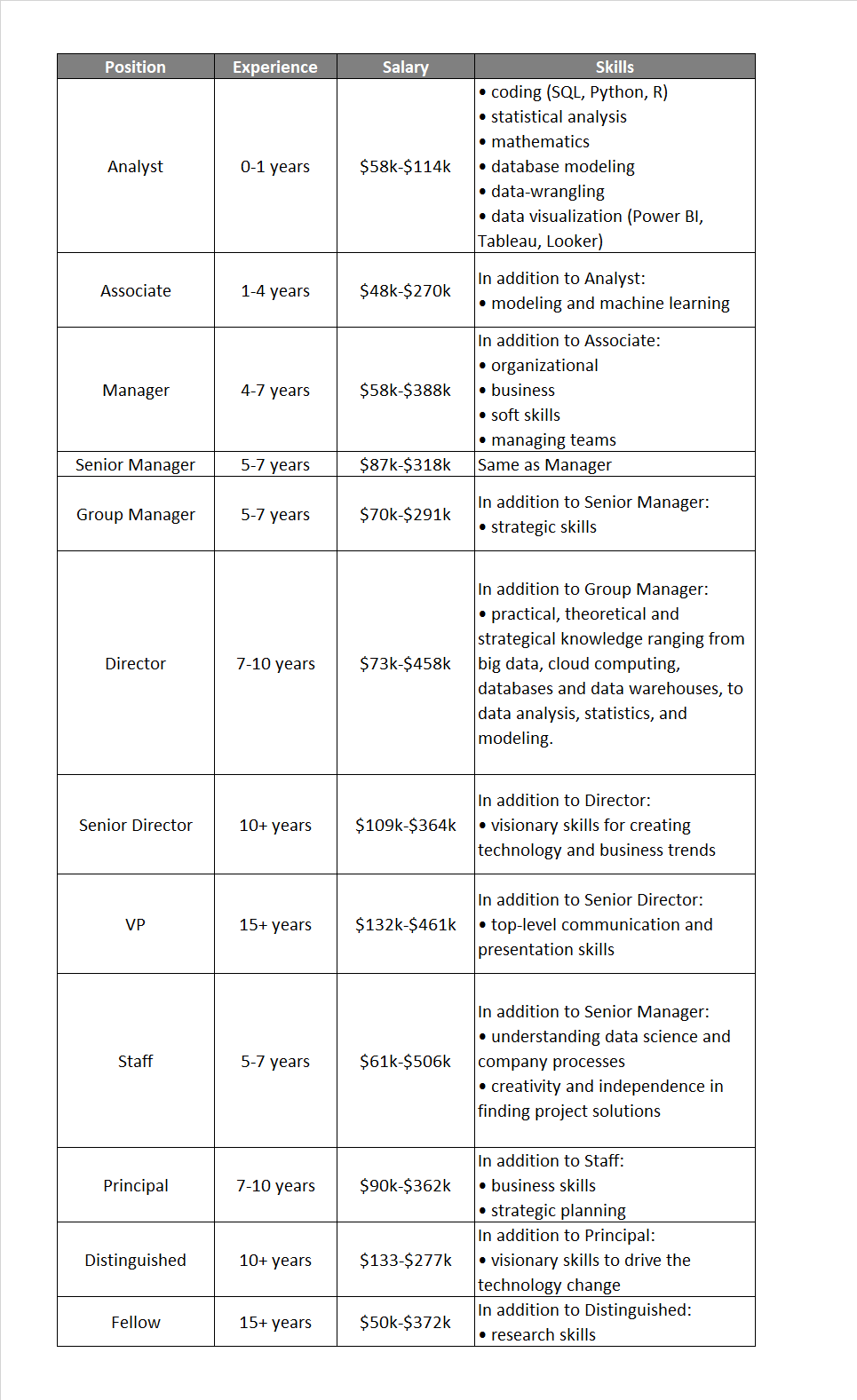
Individual Contributor
Analyst
They are full-fledged data scientists, but the ones with no or minimal experience. Those are usually fresh graduates holding a bachelor’s or master’s degree in quantitative fields, such as computer science, statistics, mathematics, etc.
At this level, you’re still not independent, and you’ll probably rely a lot on your senior colleagues to give you direction when you get stuck with something. They will also more often check your work and tell you how something could have been done (better). You’ll also ‘embarrass’ yourself by making some serious (but not too serious!) mistakes. But there’s a reason why this is in inverted commas: you must learn from others, but also your mistakes.
Experience: 0-1 years
Salary: $58k-$114k
Skills: coding (SQL, Python, R), statistical analysis, mathematics, database modeling, data wrangling, data visualization (Power BI, Tableau, Looker)
Associate
After a year or so, you could expect to become an associate. Those are more experienced data scientists that are able to work more independently. They not only complete the particular task that is a part of a project, but they can also be operatively in charge of the whole project. They get the freedom to find ways to complete the project and reach its goals. They can even change the project's scope along the way if they see there’s a need for that.
The associates serve as mentors to the younger members of the team. Even though they’re not officially managing anybody, data science managers usually delegate to the associates directly, giving them a certain freedom to engage other (more junior) team members.
Experience: 1-4 years
Salary: $48k-$270k
Skills (in addition to Analyst): modeling and machine learning
Management Track
Manager
In this position, you will still be performing operational work to a certain extent. Still, your primary task will be managing a team. What does that include? You will organize your team, delegate tasks, monitor your team’s performance, and set out strategies to achieve the team’s goals. You’ll also be mentoring them and be a bridge (but also a shield) between them and the management. This doesn’t mean only loading your team with the tasks coming from the management. It also means protecting them from too much stress and overload.
Management always boils down to trying to achieve your company’s goals and keeping your bosses happy while keeping your team happy, too.
Experience: 4-7 years and background in managing teams
Salary: $58k-$388k
Skills (in addition to Associate): organizational, business, and soft skills, managing teams
Senior Manager
The main difference between the manager and the senior manager is the experience, mainly management experience. Senior managers could also lead several teams, each having its own manager. They manage the managers and are in charge of hiring, firing, and budgeting for their team(s).
No wonder they do that because this is usually the last job position in data science before you go into one of the leadership tracks.
Experience: 5-7 years and background in managing teams
Salary: $87k-$318k
Skills: same as Manager
Group Manager
The last position in the Management Track is a Group Manager. However, this position doesn’t need to exist because it’s a role only in larger data science companies. Smaller companies don’t need the Group Manager position.
As a Group Manager, you’ll be managing one or several teams or a division. You will be in charge of setting out the strategic goals, managing and directing your team in reaching those goals, and ensuring the day-to-day operations. The job description includes monitoring the performance of your team/division, hiring, educating them, and developing their careers. You’ll also be responsible for budgeting and keeping your operations within budget.
Experience: 5-7 years and background in managing teams
Salary: $70k-$291k
Skills (in addition to Senior Manager): strategic skills
Management Leadership Track
After reaching the Group Manager position, one of the opportunities for a promotion is a Management Leadership Track. It’s a career path where you’re more dedicated to managing people and the company than using your professional data science skills.
Director
It’s a strategic position mainly focused on developing and implementing policies, procedures, and goals for the whole data science function. This position also deals with creating processes and the entire data science framework, including data architecture, data collection methodologies, storing, distribution, and use.
The Director communicates with the senior management and works on putting the data science to the best use for achieving the company’s strategic goals.
Experience: 7-10 years and background in managing teams.
Salary: $73k-$458k
Skills (in addition to Group Manager): practical, theoretical, and strategical knowledge ranging from big data, cloud computing, to databases and data warehouses, data analysis, statistics, and modeling
Senior Director
The Senior Director, along with all the duties similar to the Director, is also responsible for the relationship with the key stakeholders. If you’re in this position, you need to show really strong business acumen and understanding of your competitors and customers. Not only that you need to be up-to-date with the latest business and technology trends, but you also create them.
Experience: 10+ years and background in managing teams.
Salary: $109k-$364k
Skills (in addition to Director): visionary skills for creating technology and business trends
VP
Being the VP requires you to be even more customer-centric than the Senior Director. They often serve as the face of the company not only towards the customers but also other stakeholders such as investors, regulators, etc. This means they need to have highly developed presentation skills and be good at public relations.
They are not directly involved in managing teams, but they manage other directors and managers leading teams. Together with the board members, they develop strategies for the company and oversee their implementation. For that, they need to have a visionary mindset that will allow them to create trends and improve the company’s position in the market.
The VPs often have the power to sign agreements and internal decisions.
Experience: 15+ years and background in managing teams.
Salary: $132k-$461k
Skills (in addition to Senior Director): top-level communication and presentation skills.
IC Leadership Track
If you choose this leadership track, you won’t have your standard team to manage day-to-day. Instead, you’ll have to manage data science projects and act as an advisor. Your responsibilities in doing that depend on your seniority.
Staff
Even though this is a leadership role, you’ll spend some time coding. This, however, takes the smallest portion of your time. Your main task will be leading the data science projects. This will include planning, budgeting, preparing project documentation, and organizing cross-departmental teams. Staff provides a direction for the project members, including technical advice, mentoring, and coaching.
They are a bridge between the employees doing the operational work and the company management. As a Staff, you will be reporting on your project(s) status directly to the management.
Experience: 5-7 years
Salary: $61k-$506k
Skills (in addition to Senior Manager): understanding data science and company processes, creativity and independence in finding project solutions
Principal
The Principals provide technical direction to the management. They advise them on technological possibilities and approaches to solving business problems. As a Principal, you need to have an overall understanding of the company’s business and specifics and the available technology. You need to be aware of the effect of the technical solutions’ implementation on the different stakeholders and the risks it can pose.
The Principals also provide a high-level perspective for the project teams. You can understand it as an advisory position to them and the management at the same time.
Experience: 7-10 years
Salary: $90k-$362k
Skills (in addition to Staff): Business skills and strategic planning.
Distinguished
This is also an advisory role but even more focused on strategic planning than the Principal. They work on predicting and creating trends and advise the management on positioning the company to maximize the business benefits concerning those trends.
You will need to be in step with the technology, which often means collaboration with academia, technology leaders, researchers, vendors, etc.
Experience: 10+ years
Salary: $133-$277k
Skills (in addition to Principal): visionary skills to drive the technology change
Fellow
Becoming a Fellow is the highest position in the IC Leadership Track, and it’s analogous to the VP in the Management Track. Fellows usually possess internationally recognized specialist knowledge in a specific area of data science, and they drive change in that area.
Their expertise has a significant impact on the company's long-term goals and strategies. They often come from academia and research and are mentors to other positions in IC Leadership Track.
Experience: 15+ years
Salary: $50k-$372k
Skills (in addition to Distinguished): Research skills
Conclusion
As you saw from the data scientist career path we presented here, you have plenty of ways to steer your data science career. With experience, you get more freedom to choose.
The data scientist career path doesn’t only offer you the opportunity to forever deal with operative tasks. You can, if you want, of course. But this data science career path also gives you the move into management, where you’ll manage teams and run the company.
Maybe management positions are not something you want. Instead, you can choose to remain the IC. This leadership path has four levels and generally keeps you in your data science profession but moves you from groundwork to an advisory role. While you won’t be running a company directly, you’ll be able to impact the company’s direction and run it indirectly.
Share
